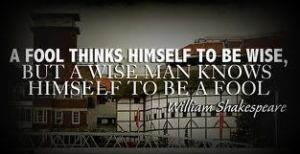“It is not in the stars to hold our destiny but in ourselves.”
My first experience of Shakespeare was a performance of The Tempest on a school trip; I hated it. Three years later I was given a copy of Macbeth as one of my ‘O’ Level books: I loved it. I read it and studied it and wrote about it. I achieved a good grade. After that, until I reached middle-age, I had very little to do with Shakespeare; I don’t enjoy the theatre much and found his plays difficult to follow. I went to see Roman Polanski’s Macbeth at the cinema in the 70s and loved that (it is still the best version), but It was only when I began helping students with their English that I started to appreciate him, and, only then, through the filmed versions.
Since then, having studied him on and off for a few years, I have discovered that I like Romeo and Juliet, Othello, The Merchant of Venice, A Midsummer Night’s Dream, As You Like It and A Winter’s Tale; I love Macbeth but baulk at the walking wood. I don’t like Hamlet or King Lear. I do like Julius Caesar, Troilus and Cressida, Measure for Measure and Coriolanus, all rarely performed, although Coriolanus does seem to be having a revival, partly due to its supposed similarities with today’s society.
 All of the Henry plays are good but particularly Henry VIII, one of the least performed. I like Richard II and love Richard III, even though it is a complete fiction (Tudor propaganda); I like Much Ado About Nothing but don’t yet understand The Tempest; Anthony and Cleopatra is marvellous; I enjoyed bits of Cymbeline, but the version I watched had a young Helen Mirren dressed as a boy (impossible to believe). I don’t like Pericles or The Taming of the Shrew. I am indifferent to Love’s Labour’s Lost, Twelfth Night and All’s Well that Ends Well. I know nothing about the Two Gentlemen of Verona, A Comedy of Errors, The Merry Wives of Windsor or King John.
All of the Henry plays are good but particularly Henry VIII, one of the least performed. I like Richard II and love Richard III, even though it is a complete fiction (Tudor propaganda); I like Much Ado About Nothing but don’t yet understand The Tempest; Anthony and Cleopatra is marvellous; I enjoyed bits of Cymbeline, but the version I watched had a young Helen Mirren dressed as a boy (impossible to believe). I don’t like Pericles or The Taming of the Shrew. I am indifferent to Love’s Labour’s Lost, Twelfth Night and All’s Well that Ends Well. I know nothing about the Two Gentlemen of Verona, A Comedy of Errors, The Merry Wives of Windsor or King John.
I think that just about covers them all; forgive me if I have forgotten anything. I enjoy watching Hamlet even though I don’t like him. Such a fuss is made about his tortuous journey and his suffering and tragic death, but I just find him a terrible whinger and get fed up with him very quickly. He is responsible for the deaths of Polonius (harmless old fool), Rosencrantz and Guildenstern (to be fair they would have had him killed otherwise, but only because of his awful behaviour), his mother and Ophelia, the one true innocent in the play. I found Ophelia the only sane person in the play and she is destroyed by Hamlet. Kenneth Branagh’s four hour film is quite entertaining but the best I’ve seen so far is Zeffirelli’s version with Mel Gibson.
 King Lear and Hamlet are two of the most popular plays today. It is easy to obtain copies of performances and there are many films of both; I have seen quite a lot of them (the best King Lear is a Russian version by Grigori Kozintsev). As I said, I enjoy watching performances of Hamlet but have no sympathy at all with the play’s theme, which to me is: spoilt, self obsessed brat prattling on endlessly about his problems and dealing with them far too late, thereby causing the deaths of many. I suppose I get fed up with critics taking Hamlet (the character) so seriously (I grant his language is wonderful) when I find him very unlikeable.
King Lear and Hamlet are two of the most popular plays today. It is easy to obtain copies of performances and there are many films of both; I have seen quite a lot of them (the best King Lear is a Russian version by Grigori Kozintsev). As I said, I enjoy watching performances of Hamlet but have no sympathy at all with the play’s theme, which to me is: spoilt, self obsessed brat prattling on endlessly about his problems and dealing with them far too late, thereby causing the deaths of many. I suppose I get fed up with critics taking Hamlet (the character) so seriously (I grant his language is wonderful) when I find him very unlikeable.
King Lear is a play often performed and analysed. I hope I’m wrong, and one day might be convinced otherwise, but I find the whole thing ridiculous. I know it is about a foolish old man mistaking flattery for love and not recognising true love, of not understanding that the giving away of territory would change everything – of not understanding anything until it is too late; but it is told in such convoluted fashion, with too many characters and too many ridiculous scenes. I cannot watch the scene on the beach near the end without laughing.
I find Macbeth one of the most watchable of plays, partly because it is so short (the shortest). Its theme is simple: overarching ambition and female manipulation. There are one or two parts where I have to suspend disbelief: the walking wood, Lady Macbeth collapses into madness too quickly, but it is a marvellously entertaining example of what Shakespeare was best at: taking basic human emotions and dramatising them; of course all drama should do this but only Shakespeare did it so well.
One thing that stands out in all the plays though, is the language; there is wonderful language in all the plays. I’ll make a ridiculous understatement and say that Shakespeare had a way with words. Like no other before him or since, he could encapsulate the most profound thoughts and feelings in what is, when studied, beautifully simple language. His best plays are a joy throughout – I can watch them once or twice a year. The recent BBC series of Richard II, Henry IV parts 1 & 2 and Henry V was superb.
The way I found access to Shakespeare was through film. Watching his plays in the theatre I find that, unless one knows the play by heart (difficult), the language is lost – while thinking about one line, it is quickly followed by another and another and so much is lost, simply because it is impossible to keep up. With film, and today almost everything has subtitles, it is possible to pause and think, to absorb and understand and thereby find a way in to the plays.
This has been only a brief and haphazard introduction into my thoughts on Shakespeare. I have already written a rather self-indulgent review of Throne of Blood, Kurosawa’s film version of Macbeth. But bear with me. I would like occasionally to share my thoughts on Shakespeare, particularly the ridiculous authorship controversy, in the future. How do other writers feel about this – any other Shakespeare lovers out there? Or am I merely wallowing in my own enjoyment of him?



